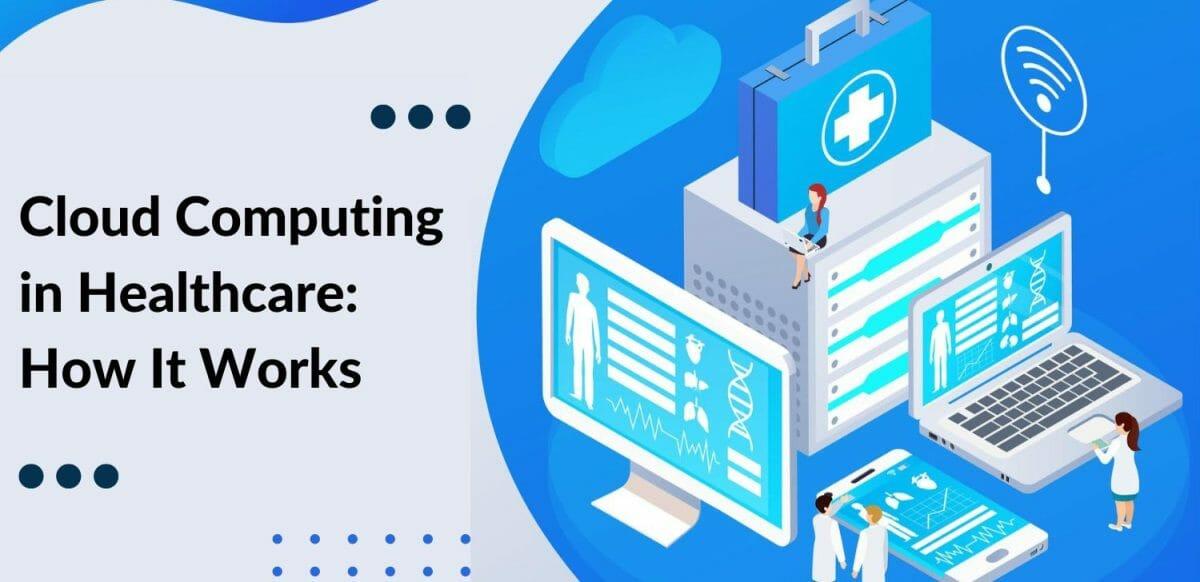
Cloud computing is the delivery of computing resources, including software, storage, and processing power, over the internet. This technology has revolutionized the healthcare industry, making it easier for healthcare providers to manage and access patient information securely. Healthcare organizations are adopting cloud computing to reduce costs, enhance patient care, and streamline their operations. In this article, we will discuss how cloud computing works in healthcare and its benefits.
How cloud computing works in healthcare
Cloud computing in healthcare involves the use of cloud-based systems to store, manage, and access patient information. Healthcare providers can store electronic health records (EHRs), patient medical history, lab results, and other information in the cloud. This information is accessible to authorized personnel from any location, enabling them to make informed decisions quickly. Cloud computing also allows healthcare providers to integrate their systems and applications, creating a seamless workflow.
Cloud computing is made up of three components: infrastructure as a service (IaaS), platform as a service (PaaS), and software as a service (SaaS). IaaS provides the infrastructure needed to run applications, including storage, servers, and networking. PaaS provides a platform for developers to create and deploy applications, while SaaS provides pre-built software applications that are accessible over the internet.
In healthcare, cloud computing is used to provide a wide range of services, including data storage, hosting, and analytics. Cloud integration solutions enable healthcare organizations to connect their systems and applications, creating a unified workflow. This allows healthcare providers to access patient information and collaborate with other providers more easily.
Benefits of cloud computing in healthcare
Cloud computing offers several benefits to healthcare organizations, including:
- Cost savings: Healthcare organizations can reduce costs by using cloud computing instead of investing in expensive hardware and software. Cloud computing allows healthcare providers to pay for the resources they need, enabling them to scale up or down as their needs change.
- Enhanced patient care: Cloud computing makes it easier for healthcare providers to access patient information quickly, enabling them to make informed decisions. This can lead to improved patient outcomes and reduced medical errors.
- Improved collaboration: Cloud computing enables healthcare providers to share patient information and collaborate more easily, improving patient care and outcomes.
- Scalability: Cloud computing allows healthcare organizations to scale their resources up or down as needed, enabling them to manage fluctuations in demand and reduce costs.
- Security: Cloud computing providers offer advanced security measures, ensuring that patient data is stored securely and protected from unauthorized access.
Cloud computing use cases in healthcare
Cloud computing is used in a variety of healthcare applications, including:
- Electronic health records (EHRs): Healthcare organizations can store patient information securely in the cloud, enabling authorized personnel to access it from any location.
- Medical imaging: Cloud computing enables healthcare providers to store and share medical images, such as X-rays and MRIs, securely over the internet.
- Telemedicine: Cloud computing allows healthcare providers to deliver remote care to patients, enabling them to access care from any location.
- Health information exchange (HIE): Cloud computing enables healthcare organizations to exchange patient information securely, improving patient care and outcomes.
- Clinical trials: Cloud computing can be used to manage clinical trial data, enabling researchers to access and analyze data more easily.
Enterprise software development and healthcare software development
Cloud computing has transformed the way healthcare organizations develop and deploy software applications. Enterprise software development involves creating software applications that meet the needs of large organizations. Healthcare software development involves creating software applications that meet the unique needs of healthcare providers.
Cloud computing has made it easier for organizations to develop and deploy software applications, enabling them to scale their resources up or down as needed. Cloud computing also enables healthcare providers to access pre-built software applications, reducing the time and cost involved in software development.
Cloud integration solutions have also made it easier for healthcare organizations to connect their systems and applications, creating a seamless workflow. This has enabled healthcare providers to access patient information more easily and collaborate with other providers more effectively. Cloud computing has also enabled healthcare organizations to store and analyze large amounts of data, providing insights into patient care and outcomes.
One of the key benefits of cloud computing in healthcare is that it enables healthcare providers to deliver personalized care to patients. By accessing patient data stored in the cloud, healthcare providers can gain insights into a patient’s medical history, current health status, and treatment preferences. This enables healthcare providers to tailor their treatment plans to the individual needs of each patient, improving patient outcomes and satisfaction.
Cloud computing also enables healthcare providers to deliver care more efficiently. By streamlining workflows and automating routine tasks, healthcare providers can reduce the time and cost involved in providing care. This can lead to improved patient outcomes and reduced healthcare costs.
However, healthcare organizations must ensure that patient data is stored and managed securely in the cloud. Cloud computing providers offer advanced security measures, such as data encryption and multi-factor authentication, to protect patient data from unauthorized access. Healthcare organizations must also ensure that they comply with relevant data privacy and security regulations, such as HIPAA in the United States.
Conclusion
Cloud computing has transformed the healthcare industry, making it easier for healthcare providers to manage and access patient information securely. Cloud computing offers several benefits to healthcare organizations, including cost savings, enhanced patient care, improved collaboration, scalability, and security. Cloud computing is used in a variety of healthcare applications, including electronic health records, medical imaging, telemedicine, health information exchange, and clinical trials.
Enterprise software development and healthcare software development have also been transformed by cloud computing, enabling organizations to develop and deploy software applications more easily. However, healthcare organizations must ensure that patient data is stored and managed securely in the cloud, and that they comply with relevant data privacy and security regulations. Overall, cloud computing is poised to continue transforming the healthcare industry, enabling healthcare providers to deliver personalized, efficient, and effective care to patients.